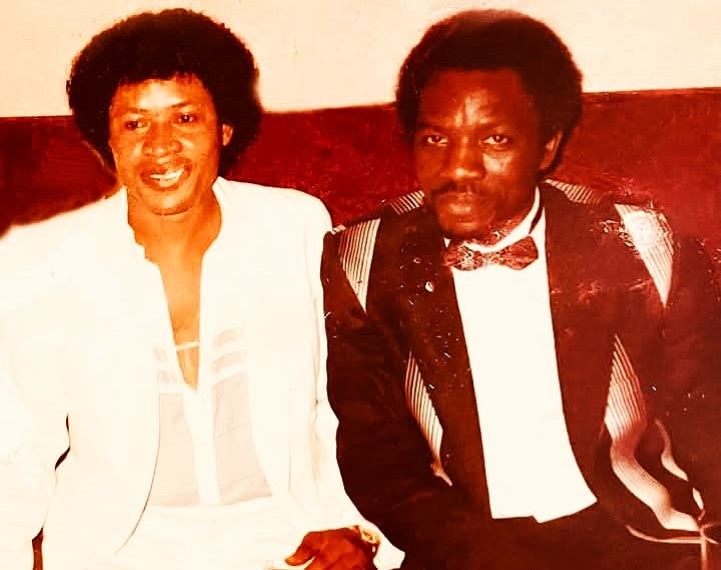It was around this time in 1983 that two rival music giants from the then Zaire, now Democratic Republic of Congo, were compelled to enter into s studio abroad and record three albums together in collaboration.
Lwambo Luanzo Makiadi (Franco) the leader and Executive of Tout Puissant Orchestre Kinois de Jazz and Pascal Emmanuel Sinamoyi Tabu (Tabuley) Rochereau fronting the L’Afrisa International, laid aside their differences and went to make three joint projects in Belgium.
Okay, at least, they were persuaded to do so. Plus, it was a commercially viable project thus hard to resist.
On the other hand, both Franco and Tabuley happened to have been in Brussels at the time, that is from December 1982 to January 1983.
Seigneur Tabuley Rochereau must have been there for end-of-year holidays, dragging along his new Belle, Maria Clare Mboyo Moseka (Mbilia Bell).
But for ‘Le Grand Matre’ Franco he was in Brussels for a business meeting with Arzoni, the Belgium luxurious tuxedo outfitter who usually hired TP Ok Jazz to produce promotional songs for the firm’s catalogue.
Other than being at the right place during the right time, the two giants also had a few things in common and these would become denominating factors in the joint music venture whose end products will emerge under the ‘Lisanga ya Banganga,’ trademark.
One of the songs that would emerge from the catalogue is ‘Kabasele in Memoriam,’ a slow tempo, modern contemporary rhumba tribute to the Congolese Music legend and mentor, Joseph Kabasele or ‘Grand Kalle!’
Le Grand Kabasele was the guru who taught the two musicians the trade.
The other denominating factor was the ace guitarist, Mavatiku Visi, known as ‘Michelino,’ who at different times played for both Franco and Tabuley bands.
The third and most important link was Fataki Lusangi popularly known as Tchika Tchika, who also ran the famous Safari Club in Bruxelles, Belgium, where the very best of Congo Basin music big bands performed.
Tchika Tchika was respected by both Franco and Tabuley and commanded influence across the Zaire Music scene and industry. In fact, it was Fataki Lusangi’s idea to get the two musicians in the studio for the collaboration releases.
When the word went around that Franco and Tabu Ley were singing together in Brussels, people back home in DR Congo raised their eyelids. It was ‘Like Serious?’
It was something unimaginable and hardly heard of given the long beliefs that the two held longtime angst against one another.
The bitter rivalry between the two music elephants went to the extent of dedicating songs bitterly dissing one another and stealing musicians from each other’s band, sometimes not for the talent, but just to rock the other’s boat, and if possible, upend it.
But other sources argue that the rivalry was simply staged to create regular headlines that will help promote their music.
It was believed that Franco and Tabuley usually held secret meetings to discuss ways of killing emerging bands, especially those made up of younger and more energetic artists.
So, when news spread of the two recording together, the underground artists who hated them, sneered that theirs was a ‘Union of two witches!’ or as described by in Lingala by Kinshasa boys, ‘Lisanga ya Banganga!”
But not to be deterred by the negativity of the labeling, the two musicians decided to name their joint production as such, ‘Lisanga ya Banganga,’ or the ‘team of witches!’
Once the two agreed to jointly record three albums, Tchika Tchika’s headache was to find a guitarist who blended both Franco’s and Tabu Ley’s styles and this was ‘Michelino,’ who once played for both giants.
Mavatiku Visi and Tchika Tchika
However by that time the guitarist, Mavatiku Visi had faded from the limelight, playing smaller venues in Congo and with poor communication then, it was very difficult to pinpoint where exactly Michelino was at the time.
Still, Tchika Tchika, a gritty man, was unrestrained and scoured the entire DR Congo and elsewhere for the guitar player.
Tchika Tchika eventually heard that the guitarist was somewhere in Eastern Congo (Zaire), having fallen on hard times, playing music in comparably nondescript venues in contrast with the guitarist’s previous high-flying gigs in the best clubs of Zaire, Zambia, West Africa and Europe.

The next thing the guitarist knew was Tchika Tchika accosting him on the streets of Goma DRC and in minutes handing him plane tickets to first Kinshasa, then onwards to Brussels.
That’s how Michelino Mavatiku Visi became the third persona in the triumvirate called Lisanga Ya Banganga, made famous by the album of the same name.
Some of the songs produced from the music joint venture of Franco, Michelino and Tabuley include the title track, Lisanga ya Baganga; Omona Wapi; Kabassele in Memoriam; Directueur General; Suittre Letter; Ngugi; Mutambula Mpipa and others.
In the production of the songs, Franco added another singer from his TP OK Jazz, the melodious Josky Kiambukuta.
However, it was Tabu Ley who really filled the project with personnel from his L’Afrisa International. Rochereau brought the saxophonist, Modero Mekanisi, guitarist Dino Vangu, bassist, Shaba Kahamba and vocalist Pompon Kuleta.
Why Ley didn’t want Mbilia Bel to feature in the Lisanga ya Banganga is something which we may never know.

